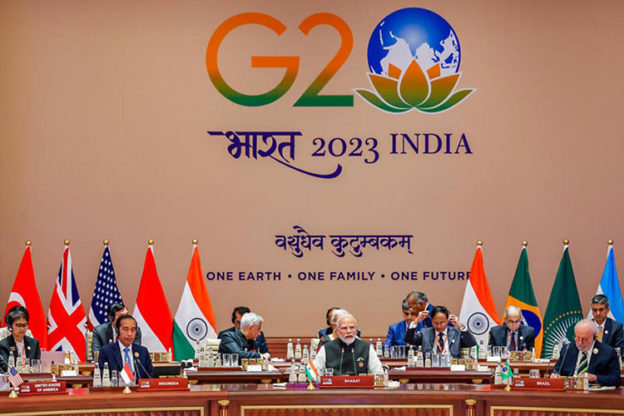The summit serves as a powerful testament to India’s growing prominence on the global stage, with some experts suggesting that only India could have achieved such a comprehensive consensus.
India pulled off the G20 Summit 2023 with perfection and garnered much praise from diplomats worldwide, who complimented Prime Minister Modi for the country’s impactful presidency. Not only did India facilitate a consensus among the divided bloc, but it also laid the groundwork for deeper future collaboration. The summit serves as a powerful testament to India’s growing prominence on the global stage, with some experts suggesting that only India could have achieved such a comprehensive consensus.
India, known for its positive relations with both Western nations and Russia, judiciously leveraged its unique position for the greater global good. The summit produced a consensus document and addressed various critical issues, including the overhaul of institutions like the World Bank. Here are five key takeaways from the G20 Summit in New Delhi that showcased India’s commending leadership:
Passing the buck! African Union’s formal admission
One of the noteworthy outcomes of the G20 summit was the formal admission of the African Union (AU) into the group, elevating it to the status of a permanent member alongside the European Union. Previously, only South Africa was a member of the G20. This move aimed to enhance the representation of the Global South within the G20, reducing the dominance of G7 countries.
The Global Biofuel Alliance
Prime Minister Narendra Modi officially inaugurated the Global Biofuels Alliance during the G20 Summit in New Delhi. The formation of the GBA has been in progress for a considerable period and holds a central role in India’s G20 presidency agenda. This alliance is designed to promote international collaboration, advance the adoption of sustainable biofuels, foster global biofuels trade, and provide technical support for national biofuel initiatives.
India, the United States, and Brazil took the lead in championing the Global Biofuel Alliance, and it launches with nine founding members, namely, India, the US, Brazil, Argentina, Bangladesh, Italy, Mauritius, South Africa, and the United Arab Emirates. Additionally, Canada and Singapore are participating as observer countries. To date, 19 countries and 12 international organizations have expressed their commitment to join the GBA.
Softer Stance on Ukraine Conflict
The G20 nations reached an agreement emphasizing that states should not acquire territory through the use of force. While the suffering of the people of Ukraine was acknowledged, the declaration notably avoided direct criticism of Russia for its role in the conflict. This marked a shift from the G20’s stance in the previous year when it condemned Russia for the war and called for its withdrawal from Ukraine. Diplomats reasoned that an outright condemnation by Russia was unlikely, but the agreement signaled a commitment from all member states to refrain from territorial aggression.
India-Middle East-Europe Corridor
Leaders from the United States, India, and Saudi Arabia announced plans to establish rail and port connections between the Middle East, South Asia, and eventually Europe. This initiative, which also gathered praise from US President Joe Biden, aims to provide an alternative to China’s Belt and Road infrastructure projects and strengthen ties between these regions. However, details about financing and timelines for the project remain undisclosed.
Climate Change Commitments: Tripling Renewable Energy Capacity and the Green Climate Fund
The G20 leaders agreed to pursue a global target of tripling renewable energy capacity by 2030 and acknowledged the necessity of phasing down unabated coal power. Nevertheless, the summit stopped short of setting specific climate goals or outlining plans to amend existing policies to achieve renewable energy targets. The discussion highlighted the need for $4 trillion annually to fund the transition to green energy, but a concrete pathway to achieve this goal was not provided.
During the Summit, Britain’s Prime Minister Rishi Sunak pledeged a substantial $2 billion contribution to the Green Climate Fund. This funding aims to assist developing nations in addressing the challenges posed by climate change. Established within the framework of United Nations’ climate change negotiations, the Green Climate Fund stands as the world’s largest fund of its kind, with its primary mission being to facilitate the financial resources required by less affluent countries to meet their carbon emissions reduction goals, promote cleaner energy alternatives, and adapt to the effects of a warming planet.
The New Delhi Declaration
The G20 embraced the New Delhi Leaders Summit Declaration. Emphasizing that “the present era should steer clear of warfare,” the G20 countries’ New Delhi Declaration, urged all nations to uphold the tenets of international law, including respect for territorial integrity and sovereignty. It underscored the importance of peaceful conflict resolution, diplomacy, and dialogue as essential components.
For Prime Minister Narendra Modi, leading the G20 has been a year-long opportunity to position India as a significant diplomatic and economic power. The summit provided a platform to attract investment, promote trade, and enhance India’s global standing. Modi’s leadership during the summit was seen as a boost to his domestic image as he sought a third term in office in upcoming elections. India’s successful hosting of the G20 marked a pivotal moment for the nation on the global stage.
https://www.financialexpress.com/business/defence-g20-summit-2023-india-triumphs-with-rising-global-influence-on-full-display-here-are-the-key-takeaways-from-this-diplomatic-success-3242242/





